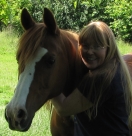When I was 16 years old, I started wearing glasses to correct my near-sightedness.
Only recently, in my 50’s, have I recognized another kind of near-sightedness in myself. I was unaware of how little I viewed of the world beyond my own life. How little I thought about, let alone understood, the impact of my daily living choices on those around me and the world at large.
I had occasionally stopped at ‘panoramic view points’ along the way. Many years ago I started using recycled paper and buying organic food. I support local businesses and growers as much as possible now, too. I recycled whatever could go in the curbside bins. I started using earth-friendly cleaning products. I participated in wildlife rehabilitation efforts and made the connection between burgeoning human populations, and habitat and wildlife loss. But other than choosing to have only one child, I felt fairly powerless to implement a solution there.
My life floated along the stream-turned-raging-torrent of consumerism. Little to no thought about where each ‘wadget and gidget’ that I surely needed came from. How was it made; with what natural resources; how far had it traveled; were its makers paid fairly; what was its total impact on the environment, including when I thoughtlessly tossed it in the trash?
What?! Those things matter?! Do I need to ask the questions about everything I eat, drink, wear, drive, play with, read, sit on, live in, climb, jump over, listen to, or touch?
Actually, yes.
I have decided that I do need to ask. As I practice, I find my range of ‘vision’ extending. I am beginning to see the visible and invisible threads that connect things and people and the planet. I am beginning to see the downstream effect of my upstream choice. I am beginning to care about the people who give their energy to the items and services that support my life. I think daily about how my every move ultimately affects this precious planet.
Is ‘perfect vision’ an achievable goal? Who knows. But it’s the goal I have in my sights.
